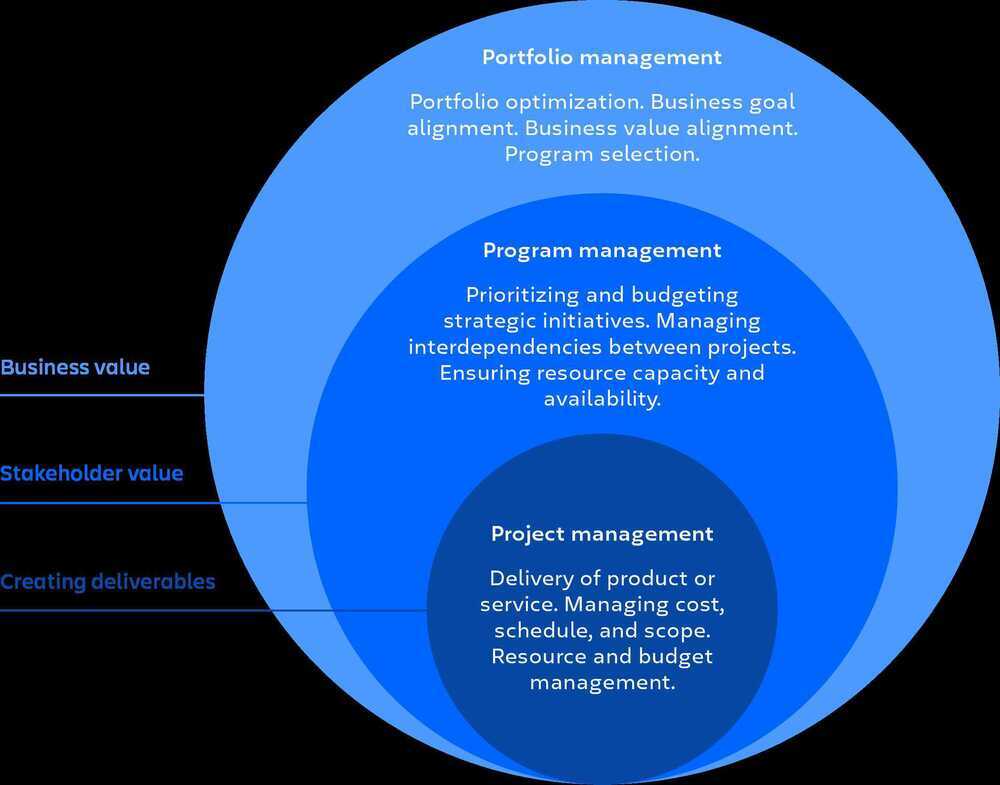Program Management
Program management is the management of multiple related projects at the same time. A program is a set of interconnected projects overseen by a program manager whose main goal is to ensure that all work ties back into company-wide goals and objectives.
Program managers also help to drive organizational change by helping with agile transformations, including helping to implement DevOps practices and principles. Program managers may align program management practices and processes with agile values such as collaboration, team autonomy and empowerment, delivering value to customers, and adapting to change in the moment. A program manager can bring agile and DevOps to life for teams across large programs or individual projects by tailoring programs to the specific requirements and opportunities of the business.
A successful program manager will also
- Gain executive buy-in for the program
- Manage expectations above and below them
- Bring cohesive decision-making to the program
- Build a resource management plan across the program
- Mitigate risks and act on opportunities by creating a risk register.
- Manage resources throughout the program, including cost management and resource allocation.
What is Effective Program Management?
For program managers to be successful, they need a host of skills they can tap into. This first and foremost include practical communication skills due to their broad responsibilities and high-level visibility given the vital nature of the programs they oversee.
There are three distinct types of communication: status reporting, direction setting, and problem-solving:
- Status reporting requires considerable written, verbal, and organizational communication capabilities. They must deliver comprehensive yet efficient status updates to a broad audience in multiple formats with the appropriate level of detail for each individual.
- Direction setting is required to inform and shape the scope and schedule of individual projects (and project managers) that roll up under their programs. Objectives and deadlines must be clear, and program managers must be willing to ask hard, probing questions to determine how projects are truly progressing.
- Problem-solving comes into play continually for program managers. When obstacles, challenges, and resistance arise (which happens quite often over the life of a program), they must be willing to dive into the details and create action plans to ensure the program isn’t put in jeopardy.
Program management vs. project management

Program management is sometimes confused with project management. Project management is the process of leading a project performed by a team to achieve certain goals, such as building a new product.
A project represents a single, focused piece of work with a specific scope and defined output. Projects can run for several years, but their main focus remains the same. A project’s success can be measured by the delivery of artifacts and deliverables that roll up to a program’s larger goals.
Project management is the process of delivering value that incrementally moves a program forward. Despite the emphasis on artifacts and deliverables, project management still involves strategy and planning, since a project manager must determine how to meet the goals laid out at the beginning of the project. Once a project is underway, a project manager tracks progress, allocates resources, manages risks, communicates, and more.
Program management entails managing a program with multiple, related projects. Since programs are linked to strategic initiatives, they are often long-running and possibly permanent. Programs continue through organizational change, contribute to multiple goals, and contain many projects that deliver specific components of the larger strategic initiative.
Projects have
- A set of tasks with a clear deliverable and a deadline for completion
- Relates to creating, updating, or reviewing a particular document, process, outcome, or another single unit of work
- A predefined scope that is limited to a specific output
- Improves quality, efficiency, cost management, or customer satisfaction in a specific and predetermined way
Programs have
- Unknown or fluid deadlines due to the large scope and impact of the work that must be done continuously over a long period of time
- Multiple deliverables with inter-related dependencies that may continue to evolve based on changing business needs
- A series of deliverables completed together to increase efficiency, accuracy, reliability, or other business needs
- The work enables the company to achieve a long-term business goal or initiative that will run in perpetuity
- Success delivers long-term benefits or unlocks new capabilities for the organization
What does a program manager do?
- Evaluate the state of the portfolio
- Manage risks
- Run the program
- Engage with stakeholders
- Refine the operating model
- Support decisions
| Program manager | Project manager |
|---|---|
| Plans strategies | Plans projects |
| Provides advice to stakeholders | Tracks progress of projects |
| Review and advise on projects | Allocates resources |
| Offers audits and QA | Manage risks |
| Mentorship to project teams | Communicate |
Links
Program management vs. project management | Atlassian
Program management - Wikipedia